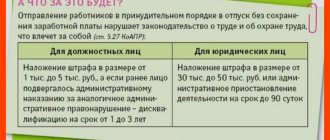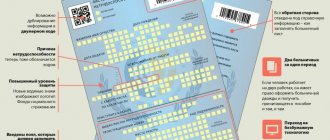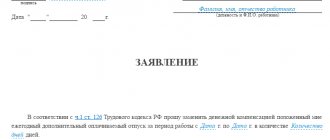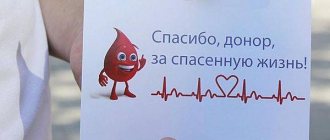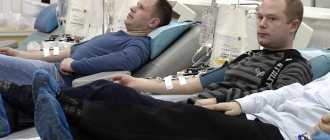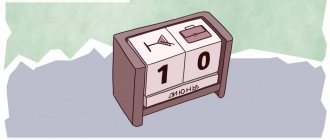21.06.2019
0
318
6 min.
In recent years, the number of donors has increased significantly. Donating blood, plasma, and other cells becomes an honor. The state strives to encourage such initiatives - doctors receive the necessary material for treatment and recovery, patients have a chance to recover and save their lives. Citizens and employers often have a number of questions about voluntary blood donation: how much time should be given for this, how to process it and pay for it. Donor days are established by the Labor Code in Article 186, which specifies the main provisions for the provision of rest and payment for it.
Regulatory framework
The main document regulating the relationship between the employer and employees is the Labor Code. It regulates all the basic concepts relating to work, rest and payment. Art. 186 of the Labor Code of the Russian Federation explains the provision of donor days and the procedure for payment for this time. It includes all the basic explanations regarding this concept and how to use it. Donation issues are more thoroughly regulated by Federal Law No. 125-FZ of July 20, 2012.
When arranging free days for donors, the employer is obliged to strictly follow the established standards, since articles of the Labor Code and 125-FZ are far from advisory in nature. Denial of the right to rest and compensation for it amounts to serious violations of the rights and freedoms of hired persons and may entail administrative punishment in the form of monetary fines or other consequences.
Additional leave
If unused days have accumulated over a 12-month (year) period, they can be used as additional leave for the donor. But they must be used from the moment of the 1st blood or plasma collection. The employee has every right to divide these days and add them to the main vacation.
Accordingly, the decision must be notified to management. Already based on the available data, management should record this in the journal. An employee may also prefer to use these days as additional rest. To do this, he must write a statement, and the employer must grant his request.
Employee's application for adding an additional day of rest to annual paid leave (sample)
The concept of donor days
A donor is a person who voluntarily donates his blood and its components for medical purposes. In order to become a donor, it is not enough to just have a desire; you must undergo examinations and establish your suitability, because the main condition for all those donating is a healthy body.
Donor days are paid time off that are given to any employed citizen. They are provided according to the following scheme:
- For medical examination.
- For direct donation of blood or its components.
- To restore health and as moral compensation.
When applying for time off, you should focus solely on your own plans and capabilities; the employer cannot limit this right by day of week or total number during the reporting period.
Additional methods of encouragement include issuing special meals to citizens, as well as awarding badges of honor and certificates.
Body check
Conducting a preliminary medical examination and taking tests is a prerequisite for donors. The fact is that not every person can fulfill such an honorable mission. The biological material provided must be of high quality, but previous diseases or congenital genetic abnormalities may negatively affect the composition of the blood. For this reason, before you directly begin donating blood or its other components, you should obtain a medical certificate of fitness for the procedure.
Article 186 of the Labor Code of the Russian Federation obliges the employer, at the request of employees, to provide them with days off for medical examinations before donation.
However, it does not clearly indicate the need to pay for such time off. This ambiguity gives employers a reason to interpret the law at their own discretion, refusing to accrue payments. This approach is fundamentally erroneous, and Article 165 of the Labor Code can confirm this. It specifies the cases in which the employee must be paid compensation. The fulfillment of public duties, which is donation, is included in the points of this article.
Blood donation day
On the day when the employee decides to donate blood or its other components, he is relieved of his work duties for the entire shift. Please note that taking a day off is the employee’s right, but giving it is the employer’s responsibility. Therefore, the person himself may not want to take time off directly on the delivery date. However, if he refuses, he does not lose this right, but has the opportunity to take it at another time more convenient for himself. The day off can be taken at any other time until the end of the calendar year.
The day of blood donation is issued with the preservation of wages. If it is postponed, then the average salary is calculated upon its completion and not earlier. The legislation is quite flexible in regulating this issue, because it strongly encourages donation and such extensive guarantees make it possible to popularize this type of social activity.
Article 186 of the Labor Code of the Russian Federation. Guarantees and compensation for employees in case they donate blood and its components
1. A person who voluntarily donates blood and its components for medicinal purposes is a donor. Donation of blood and its components is a freely expressed voluntary act. It is divided into the following types: blood donation, plasma donation, incl. immune plasma donation and plasma donation for fractionation, blood cell donation. Taking blood and its components from a donor is permissible only if the donor’s health is not harmed. Government authorities of the Russian Federation encourage and support the development of voluntary gratuitous (free) donation.
2. The legal status of donors, in addition to Article 186 of the Labor Code of the Russian Federation, is determined by the Law of the Russian Federation “On the donation of blood and its components.”
3. Every capable citizen over the age of 18 who has undergone a medical examination can be a donor of blood and its components. A medical examination of the donor before donating blood and the issuance of certificates about his state of health are free of charge. Depending on the frequency of donating blood and its components, donors are divided into the following categories: active (cadre) donors who have 3 or more blood (plasma, cyto) donations per year, and reserve donors who have less than 3 blood (plasma, cyto) donations per year. year. Medical examination of the donor is carried out in health care organizations that procure, process, store and ensure the safety of donor blood and its components.
The procedure for medical examination of a blood donor and its components was approved by Order of the Ministry of Health of Russia dated September 14, 2001 N 364 (BNA RF. 2001. N 46). Each time a donor is taken, the donor is subject to a mandatory medical examination to detect HIV infection (The rules for conducting a mandatory medical examination to detect the human immunodeficiency virus (HIV infection) are approved by Decree of the Government of the Russian Federation of October 13, 1995 N 1017 // SZ RF. 1995. N 43. Art. 4070).
On the day of donation of blood and its components, as well as on the day of the medical examination, the donor is exempt from working in the organization, regardless of its form of ownership.
The employee’s attendance at work on the day of blood donation is determined by an agreement between the employee and the employer, which must be drawn up in writing. In this case, the employee is given another day of rest at his request. If an agreement is not reached, the employee does not go to work on the day of blood donation. It is not allowed to enter into an agreement with an employee engaged in heavy work and work with harmful and (or) dangerous working conditions; it is impossible for him to go to work on this day.
If the day of blood donation coincides with a weekend, a non-working holiday, or falls during the period of annual leave, then the employee has the right to choose whether to take another day of rest or not (Part 3 of Article 186 of the Labor Code of the Russian Federation).
In addition, the employee is given an additional day of rest after each day of donating blood and its components. He has the right to add this day to the annual paid leave (main, additional) or use it at other times during the year after the day of blood donation.
4. The guarantee that an employee will retain his average earnings for the days he donates blood and its components and that days of rest will be provided in connection with this applies to all employees, regardless of whether they donated blood and its components free of charge or on a paid basis.
5. In accordance with the procedure established by the legislation of the Russian Federation, the donor is compensated for damage caused to him by damage to his health in connection with his performance of the donor function, including the costs of treatment, medical and social examination, social, labor and professional rehabilitation. The donor's disability that occurs in connection with his performance of donor functions is equal to the disability that occurs as a result of a work injury (Article 8 of the Law on Donation).
6. On the day of blood donation, the donor is provided with free food at the expense of the budget that provides financial support to the health care organization engaged in the procurement of donor blood (Article 9 of the Law on Donation).
A donor who donates blood and (or) its components in a total amount equal to two maximum permissible doses during the year is provided with the following additional measures of social support: during the year - temporary disability benefits for all types of diseases in the amount of full earnings, regardless of length of service ; during the year - priority allocation at the place of work of preferential vouchers for sanatorium and resort treatment (Article 10 of the Law on Donation).
When applying Article 186 of the Labor Code of the Russian Federation, it should be taken into account that citizens who have donated free blood 40 or more times or plasma 60 or more times are awarded the “Honorary Donor of Russia” badge by the federal executive body responsible for developing state policy and legal regulation in the field of healthcare, in the manner established by the specified federal executive body, and have the right to: extraordinary treatment in state or municipal healthcare organizations within the framework of the Program of State Guarantees for the provision of free medical care to citizens of the Russian Federation; priority purchase at the place of work or study of preferential vouchers for sanatorium and resort treatment; provision of annual paid leave at a time convenient for them; annual cash payment in the amount of 6 thousand rubles. in the manner established by the specified federal executive body. Funds for this payment in the form of a subvention to the budgets of the constituent entities of the Russian Federation, as well as the size and timing of its indexation are provided for by the federal law on the federal budget for the corresponding year. Citizens of the Russian Federation awarded the “Honorary Donor of the USSR” badge enjoy all the social support measures defined for citizens awarded the “Honorary Donor of Russia” badge (Article 11 of the Donation Law).
Providing an annual cash payment to citizens awarded the “Honorary Donor of Russia” (“Honorary Donor of the USSR”) badge does not exclude the possibility of them receiving a monthly cash payment established for them on other grounds (disabled person, veteran, etc.).
7. Decree of the Government of the Russian Federation of August 26, 1995 N 842 approved the Regulations on the badge “Honorary Donor of Russia” (SZ RF. 1995. N 36. Art. 3549).
The rules for awarding citizens with the “Honorary Donor of Russia” badge and the Rules for providing an annual cash payment to citizens awarded the “Honorary Donor of Russia” badge were approved by Decree of the Government of the Russian Federation of November 19, 2004 N 663 (SZ RF. 2004. N 48. Art. 4793).
8. The Russian Federation transfers to the state authorities of the constituent entities of the Russian Federation the authority to provide social support measures to citizens awarded the “Honorary Donor of Russia” badge.
State authorities of the constituent entities of the Russian Federation and local governments have the right, within the limits of their competence and available funds, to make decisions on additional measures of social support for donors. State authorities of the constituent entities of the Russian Federation have the right to empower local self-government bodies by the laws of the constituent entities of the Russian Federation to provide social support measures to citizens awarded the “Honorary Donor of Russia” badge (Article 11 of the Law on Donation).
Subjects of the Russian Federation establish the following measures of social support for donors. Citizens awarded the sign “Honorary Donor of Russia” or “Honorary Donor of the USSR”, in accordance with the Law of Moscow dated November 3, 2004 N 70 “On measures of social support for certain categories of residents of the city of Moscow” (Vedomosti of the Moscow City Duma. 2004. N 12. Art. 299) is provided:
- 1) the right to free travel in the city of Moscow on all types of urban passenger transport (except taxis and minibuses);
- 2) free production and repair of dentures (except for the costs of paying for the cost of precious metals and metal-ceramics) for medical reasons;
- 3) 50 percent discount on utility bills in the manner established by the Moscow Government. They are also given a 50 percent discount when paying for medicines according to doctors’ prescriptions (Order of the Moscow Government dated August 10, 2005 N 1506-RP “On the implementation of social support measures for certain categories of residents of the city of Moscow for the provision of medicines and medical products sold by doctors' prescriptions free of charge or with a 50 percent discount" // Bulletin of the Mayor and Government of Moscow. 2005. N 56; Law of St. Petersburg of October 10, 2005 N 487-73 "On preferential provision of medicines and free dental prosthetics for certain categories residents of St. Petersburg" // Bulletin of the Legislative Assembly of St. Petersburg. 2005. N 12). The right to purchase a discount ticket for travel on public transport, the right to support in paying for housing and communal services in kind are also provided for in the Decree of the Government of the Kabardino-Balkarian Republic of July 29, 2005 N 269-PP “On social support for citizens awarded the badge “Honorary Donor of Russia” (Kabardino-Balkarian Pravda. 2005. N 205), etc.
Documenting
Taking time off to donate blood does not require advance scheduling, but does not replace the need to document paid time off. The law does not require donors to notify employers about time off in advance. However, it is better to plan this action and warn the organization’s management about the impending absence. But failure to appear without notice will not result in dismissal or reprimand, provided that the employee presents a certificate from a medical institution.
The standard registration procedure requires the following step-by-step actions:
- The donor writes an application for time off.
- An order is issued to issue a day off and pay for it.
The employer is obliged to reflect the fact of the employee’s absence in the timesheet and the reason for it. All actions must be subsequently confirmed by a medical certificate, which will prove the validity of the declared act.
Reflection in the accounting sheet
The time sheet is an actual reflection of the activities of each employee. It records all attendances and notes the reasons for non-appearances. Information in the report card form is entered in coded form, which allows not only to condense it, but also to prevent discrepancies. Since the information entered into the cells of the document subsequently forms the basis for salary calculations, they must be entered correctly. As a rule, each site has its own employee responsible for maintaining the timesheet; the responsibilities for filling it out are assigned to him in the job description.
Each reason for absenteeism has its own coding, which is presented in two versions:
- Literal.
- Numerical.
Unified forms for keeping track of working hours contain a list of codes recommended for use. Organizations can develop their own symbols. To mark donor days in the report card, the following codes are used:
- G or 23 – medical examination, as well as donation of blood and its components.
- OV or 27 – additional day off.
When the employee comes to the workplace on the day of delivery, a mark of attendance is placed - I or 01.
Employee statement
If an employee goes to fulfill his social duty and wants to take advantage of the guarantees provided to him on the same day, then he may not write a statement at all. When returning to work, he is obliged to provide the employer with a medical certificate confirming the justification of his absence, and the HR department will prepare an order. But if there is a desire to transfer the due time off to another time, then you cannot do without an application.
To compile this document, you must use the proposed scheme:
- The header is standard and contains information about the organization and the donor. It contains the name of the company, full name and position of the manager, full name and position of the applicant.
- The text expresses a request for days of rest. The reason for their provision is indicated. The start and end dates of time off are specified.
The document is signed by the employee and the date of submission is indicated at the bottom.
Order
An order for the issuance of donor days and their payment is drawn up for any scenario. This document confirms that the employee was on leave with the knowledge of the employer and gives instructions for further actions within the organization.
The order is drawn up in any form and contains the following information:
- Document number and date of publication.
- Place of compilation.
- Information about the donor - full name and position.
- Reason for issuing time off.
- Date of immediate rest.
- Date of performance of public duty (if it differs from the day of rest).
- The basis for issuing an order is an application and a medical certificate.
- Signature of the head of the organization.
- Employee's introductory signature.
Based on the issued order, data is entered into the working time sheet and the average wage is calculated for the days of registered time off.
Exemption from work on the day of delivery of biomaterials
Article 186 of the Labor Code of the Russian Federation clearly states that an employee who donates blood or plasma must be released from work for a good reason. According to local regulations, in case of absenteeism, an employee must have a good reason. Otherwise, this is counted as absenteeism, and accordingly, the employment relationship with the employer may be terminated.
The same regulations apply to donors. But since the legislation does not clearly define the acts for registering donation, some controversial issues may arise. To avoid this, you must do the following:
- The donor must undergo a medical examination;
- Notify management of absence from work due to a valid reason, that is, donation;
- Provide a certificate in form 401/у. It indicates that on that day the employee underwent a medical examination and submitted biomaterials;
- The donor must have a certificate of form 402/y.
If an employee has decided to go to work, he must write an application addressed to the employer. It should display a request for admission to the workplace and from a certain time. Specify the date, day, month and time.
Application for an additional day of rest for a donor (sample) Application for an employee-donor to go to work on the day of blood donation (sample)
Providing time off
By default, time off for donating blood is issued directly on the day of donation. But in fact, it can be transferred to another date.
But the day of medical examination does not imply such freedom, and you can use it only after visiting the hospital. The opportunity to donate blood is limited in time. Donors can return to the hospital only after three months. Since the law allows you to vary your rest time at your discretion, they can be accumulated.
However, you should take time off during the year because it cannot be transferred to another period. Please note that upon dismissal, they also cannot be issued by another employer.
If desired, rest days can be added to regular annual vacations - main or additional.
How to book a vacation
Before thinking about how to arrange a vacation, you need to consult directly with your management. The donor employee must notify his management in advance about the addition of donor days to the main vacation. The employer, for his part, must make the appropriate notes in the journal. You can take these (donor) days at any time and use them as additional days off during the year.
The essence of document preparation comes down to the following sequential actions:
- After blood collection, the donor-employee will receive a certificate confirming this medical procedure.
- The certificate will need to be submitted to the HR department at the place of work. The document that is handed over to the HR department employee is called certificate No. 402/u.
Sometimes a situation may arise that today and now a donor day is not required. Then the company employee has every right to add them to his days off or vacation days.
Experts say that when adding a donor day to paid leave, each employee must follow the following algorithm:
- Get a certificate from a medical representative. institutions where blood or its components were directly collected.
- This certificate will need to be provided to the HR department at the place of work.
- Then you should write an application to provide the employee with donor days.
- An employee of the HR department will certify it with the seal of the organization from the head of the company or the deputy head of the enterprise.
- A decree will be issued to supplement vacation with donor days. This decree will subsequently be submitted to management for consideration and only after it has been certified with a seal, donor days will be added to the vacation.
The main thing is not to forget to take a certificate in form No. 402/u at the blood collection point from the medical specialist on duty.
Expert commentary
Kireev Maxim
Lawyer
In order to receive additional leave, an employee must write an application. It must state a request for several days of rest. It is necessary to indicate the specific number of days, as well as the dates when you were not at work.
Based on the document, the employer is obliged to issue an order to provide days off to the employee. You need to be aware of one important nuance: if an employee takes a day off on the day of donating blood or plasma, therefore, he does not write a statement, and there is no order, that is, it is also not issued.
Payment for all days accumulated by donating blood or other biological material is based on the average salary of the employee in the current period. In other words, payment occurs in exactly the same way as for the main annual leave.
Donor days must be taken off, regardless of their accumulated number, within a year from the date of collection of biological material. For example, the first intake occurred on 02/08/2017, the next one on 04/05/17, and so on. That is, one day off should have been used before 02/08/2019, and not until 12/31/2017, as some employers mistakenly think.
Additional day of rest
Article 186 of the Labor Code of the Russian Federation, in addition to direct rest on the day of blood donation, indicates the need to provide an additional day off. It must also be paid by the employer based on average earnings. This day off is a kind of encouragement for social activity and consciousness.
How to use
Additional time off can be taken by a donor in several ways. Moreover, when determining its choice remains exclusively with the employee himself. The manager cannot influence the choice of date or set restrictions in any way.
Time off is given to the donor in two ways:
- Immediately after the day of blood donation. In this case, he does not require the employee to write a statement.
- On any other date.
When transferring additional time off, it must be taken into account that the right to receive it remains for a year and does not transfer to the next calendar period. Citizens can accumulate additional days and form such mini-vacations from them. In the application for vacation, it is necessary to indicate all the actual periods for which it will be issued. After submitting a written request for leave, it will be virtually impossible to change the dates entered.
Blood donation day
Before an employee decides to become a donor, he must inform his management about this. And since this employee is performing a significant job for society, written notification to higher authorities does not need to be notified.
Important! If there is no written explanation for absenteeism, then the employee may be fired. Therefore, it is better to notify your superiors in advance, and you need to submit the appropriate certificate, namely in form 402/u. It indicates that the person has undergone a medical examination and can be a donor. Its details must be entered in the employer's journal.
Maintaining average earnings
The day of medical examination, blood donation and additional day off must be issued by the employer while maintaining average earnings. This means that they must be paid in a general manner - when calculating wages, and not separately upon registration.
To calculate the amount of payment for donor days, one must be guided by the standards set out in Article 139 of the Labor Code of the Russian Federation.
They establish the following calculation rules:
- The amount of wages accrued for the billing period is taken.
- It is divided by the number of days worked in a given month.
- The amount received is multiplied by the number of days off provided.
- The calculation is made in the month in which the donor holidays were issued, and not in the month in which they were issued.
The amount of wages includes all accrued income, which is an incentive for the work performed. Financial assistance or social benefits are excluded from the total salary. Vacation and sick pay accrued during this period are also not taken into account. Please note that income should be divided by actual days worked, and not by calendar days.
Who can be a donor
Any citizen who has no contraindications can become a donor. Another important condition is the age of majority.
There is no rule in labor legislation that would oblige an employee to notify his boss that he will be absent from the workplace on a certain day.
It should be understood that payment will be made only if the employee presents a certificate confirming that he was at the blood donation point.
Commentary to Art. 186 Labor Code of the Russian Federation
1. Blood donors are persons who have undergone a medical examination and voluntarily donate blood and (or) its components.
In accordance with Part 1 of Art.
12 of the Federal Law of July 20, 2012 N 125-FZ “On the donation of blood and its components”, a donor can become a capable person who is a citizen of the Russian Federation or has been legally residing on the territory of the Russian Federation for at least one year, a foreign citizen or a stateless person who has reached the age of 18 years or who has acquired full legal capacity before reaching the age of 18 years in accordance with the legislation of the Russian Federation, who has expressed a voluntary desire to donate blood and (or) its components, has undergone a voluntary medical examination and has no medical contraindications for donating blood and (or) its components.
a) release from work on the day of donating blood and its components, as well as on the day of the related medical examination;
b) providing another day of rest if the employee went to work on the day of donating blood and its components;
c) providing another day of rest in case of donating blood and its components during the period of annual paid leave, on a day off or a non-working holiday;
d) providing an additional day of rest after each day of donating blood and its components, or adding these days to the annual paid leave or using them at other times;
e) maintaining the average salary on the days of blood donation and providing days of rest in connection with this (see Determination of the Armed Forces of the Russian Federation of March 2, 2012 N 56-B11-17).
3. On the day of the medical examination related to the donation of blood and its components, the employee must be released from work.
The procedure for medical examination of donors requires the donor to appear for examination at the department (office) for registration and recruitment of donor personnel at blood transfusion stations, the blood transfusion department (office) of medical institutions and excludes the donor's appearance at work on the day of the examination.
4. On the day of donation of blood and its components, the donor, by agreement with the employer, can go to work. This possibility is excluded in cases where the employee is engaged in work with harmful and (or) dangerous working conditions.
If an employee goes to work on the day of blood donation, he is given another day of rest. Providing another day of rest is carried out at the request of the employee.
The employee must notify the employer in advance about the time of use of this day. Unauthorized use of another day of rest for the specified reason should be considered a violation of labor discipline, but such a violation is not absenteeism (subclause
“d” clause 39 of the Resolution of the Plenum of the RF Armed Forces of March 17, 2004
No. 2 “On the application by the courts of the Russian Federation of the Labor Code of the Russian Federation”). To avoid misunderstandings, it is advisable to determine the time of using another day of rest (or the procedure for notifying the employer about the time of its use) upon reaching an agreement between the donor and the employer about the donor going to work on the day of blood donation.
5. Since when donating blood and its components during the period of annual paid leave, on weekends and non-working holidays, providing another day of rest is the responsibility of the employer, the employee’s desire determines only the time of use, and not the very fact of providing such a day.
6. Additional days of rest after each day of blood donation can either be used immediately following the day of blood donation, or added to annual paid leave, or used at any other time during the calendar year.
The right to choose when to use these days belongs to the employee, however, he must notify the employer in advance of his desire to add them to his vacation, at least before the next blood donation.
7. Guarantees in the form of release from work and additional days of rest, as well as preservation of average earnings during this time, are provided to all donors, regardless of whether they donate blood and its components for a fee or free of charge.
8. In accordance with paragraph 20 of Art. 255 of the Tax Code, expenses for remuneration of donor employees for days of examination, blood donation and days of rest provided after each blood donation are included in labor costs when calculating income tax.
Current version of Article 186 of the Labor Code of the Russian Federation: Article 186. Guarantees and compensation to employees in the event of donation of blood and its components
Medical examination day
A potential donor must undergo a preliminary medical examination. The Labor Code of the Russian Federation stipulates the manager’s obligation to provide the worker with a day off for this period and to pay him according to average earnings. To confirm the procedure, you must provide a medical certificate in form No. 401/u. Many employers ignore this responsibility if the medical examination has not been fully completed. However, according to the definition of the St. Petersburg City Court No. 33-4615/12, if the donor did not have time to fulfill his obligation (to undergo an examination and donate blood) in a day, his average earnings are retained.
An employee is not required to notify the employer in advance of his intention to donate blood. If he did not show up for work, but brought a certificate the next day, the previous day is not absenteeism. Accordingly, the report card should indicate code “G” or “23” - absence from work due to the performance of government duties. The blood donation day may fall on the last day of the month. To avoid the situation of adjusting the report card and collecting signatures of all responsible persons, the internal regulations should stipulate the obligation of employees to notify the employer in advance of their intention to undergo a medical examination.
The procedure for making changes to the timesheet is not regulated by the State Statistics Committee. Therefore, it is better to use general rules when working with primary documentation. Cross out the incorrect text and amounts with one line, and write “corrected” and the correct values at the top.
What to do if the employer does not want to give rest days to the donor?
Federal Law No. 125 states that leave for blood donors is granted only on the basis of certificates No. 401/ and No. 402/u, which they must give to their employer. However, there are pitfalls in this matter that you need to be aware of:
- Sometimes employers try to punish an employee who has not shown up for work for two days for absenteeism. The Labor Code of the Russian Federation does not say that the employee is obliged to warn the employer that he is going to donate his blood. Therefore, punishing the employee in this case will be illegal.
- A violation of the law can also be considered when an employee is given only one additional day off, provided that he submitted the biomaterial on a day off or during the vacation period. By law, the employer in such cases is obliged to compensate for two days.
- The administration of the company where a person works cannot indicate which days the employee should take. The employee himself chooses the most convenient dates for additional vacation.
Important!
If a donor’s rights are violated, he should contact Rostrud, which specializes in resolving conflicts between employees and employers.



